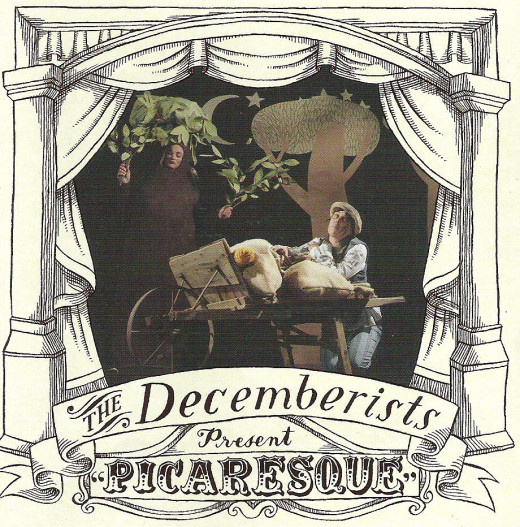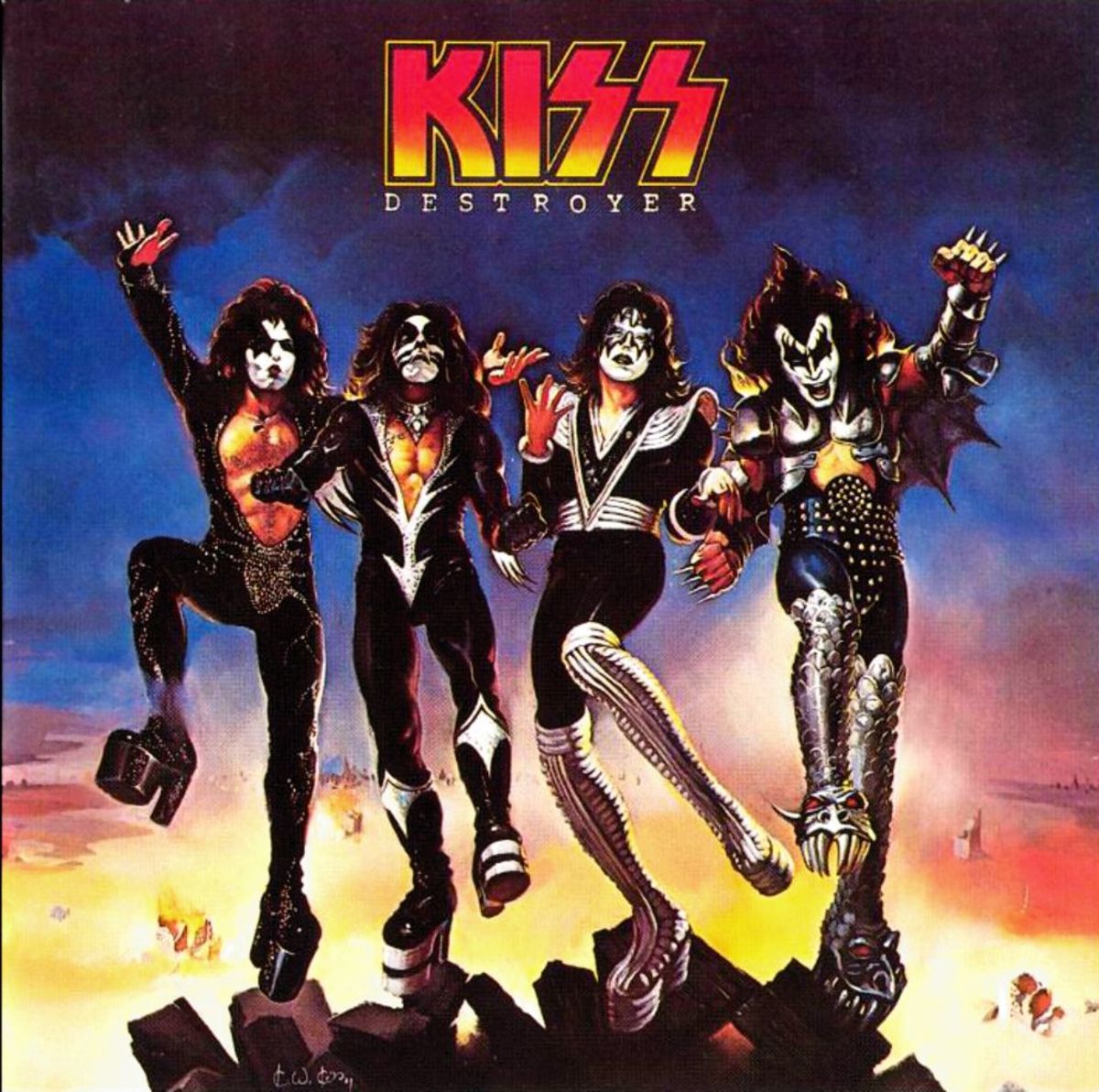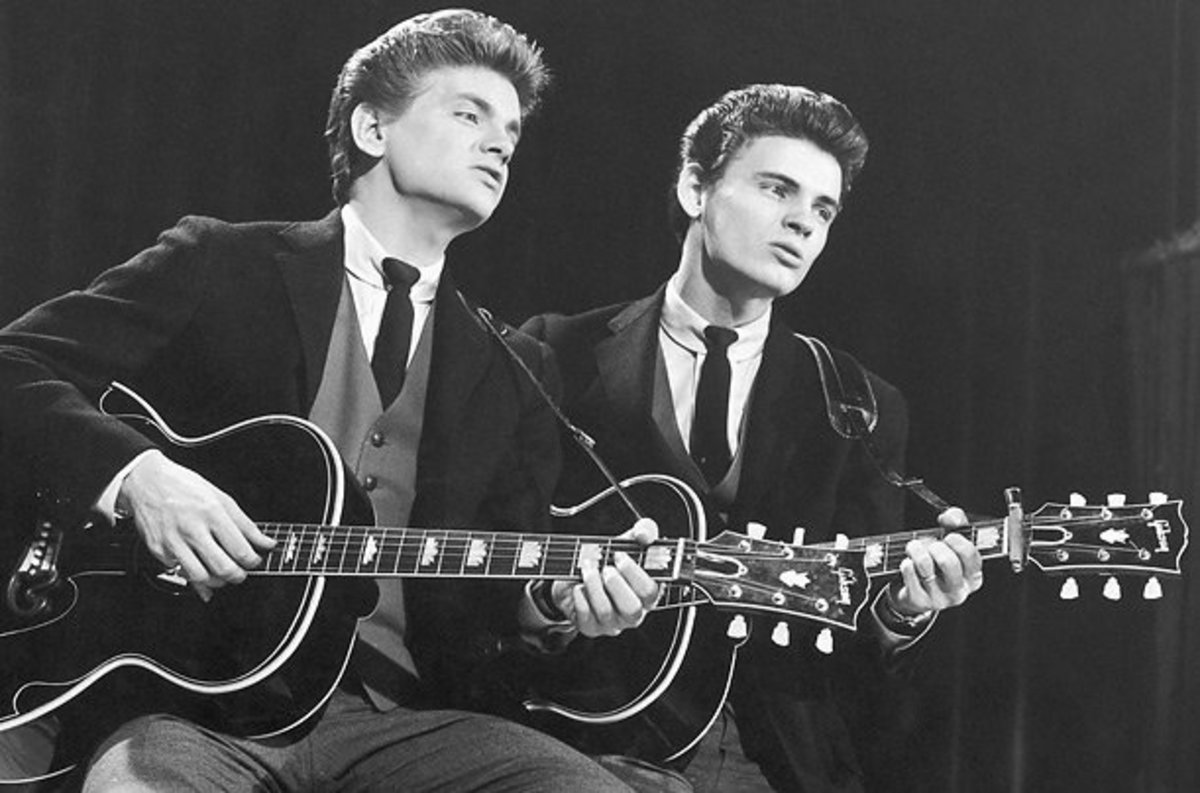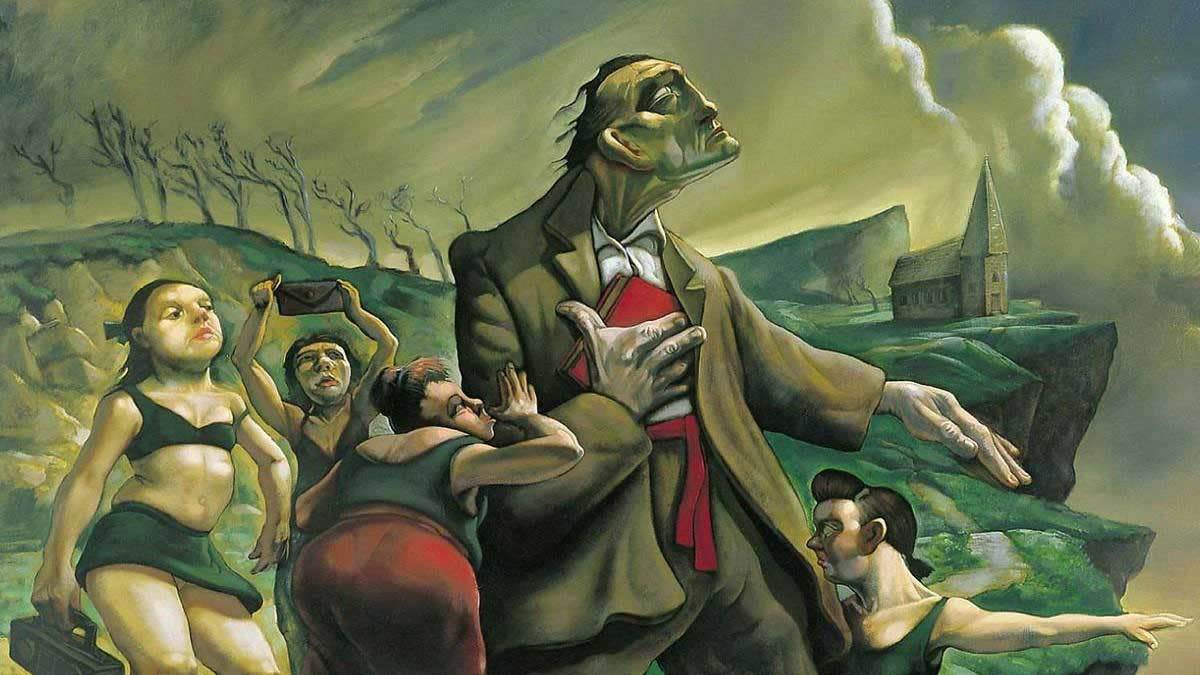Concept Album Corner - 'Picaresque' by The Decemberists

When one hears the word ‘swashbuckling’, the imagery of sea battle, rife with pirates and thieves alike clashing shimmering silver swords and blades at the crow’s nest of a ship whilst chaos and cannon fire roar below, can easily come to mind. ‘Swashbuckling’ is a word that brings to mind the thought of adventure, sea-sides, and the lives of the European common-folk throughout the 1800s. Stories like this seem to be pretty popular to tell, especially back in their respective time periods. So much so that a subgenre of fiction writing was created around the sixteenth century, the stories of which were called ‘picaresque novels’.
Coined from the Spanish word ‘picaro’ meaning ‘rogue’ or ‘rascal’, picaresque novels dealt with exactly that sort of character: rogues and rapscallions of poor social standards who lived in a wretched, crapsack society, living by their street-smarts. Stories of this nature were and are typically written with satire being a major element in mind as well as stark realism and humor, sometimes creating a lovely brand of Gallows Humor in the process. From the seventeenth century onward, many famous writers and pieces of literature have been influenced by this brand of writing. Charles Dickens’ first six novels were inspired by it, the story of Don Quixote probably rose to fame because of it, and even more modern writers like Hunter S. Thompson took a great deal of influence from the style of picaresque novels. So it’s certainly a change of pace for a band to emulate the style of the picaresque novel in a whole album.
As with many artists that I’ve reviewed in the past, The Decemberists are a bunch who are a little more ‘out there’ than most bands. Formed in Portland, Oregon by Colin Meloy, Jenny Conlee, and Nate Query, The Decemberists gained more members to the band as time went on, signing onto various different record labels. Meloy, the lead singer and lyricist of the group, often writes songs that vary from typical hipster-fare of quirky, introspective pop ballads to rollicking European thief songs. Overall, Meloy is fond of using a narrative in his songs to create extravagant tales from the perspectives of soldiers, sailors, and sweethearts. This man was practically made to do something with the ‘picaresque’ in one way or another.
1.) The Infanta – We open on the sound of a tribal howl of some animal or handmade instrument before the heavy beat of drums roll into the scene for Colin to begin serenading us an almost Indian or Arabic-sounding tale, in music and in lyrical narrative, of the birth (or possible death) of a royal daughter, the titular ‘Infanta’. Though not a roguish tale in itself, it seems to set the landscape for the songs to come, of a world ruled by an extravagant royal family, similar to the setting of the Arabic epic, 1001 Nights. The lyrics and descriptions are fantastical in nature and seem like the literary form of illustrations that one would find in a book: containing a multitude of details that are portrayed in an extravagant fashion. A phalanx on camelback/Thirty ranks on a forward track/Followed close, their shiny bright standards a-waving. The songs only builds and builds with the fast and furious smashing of drums accompanied by the pluck of a sitar-like instrument and organ. The lyrics, as for the rest of the album, describe set-pieces rather than a unified narrative, meant to draw the listener into a world brimming with pure atmosphere. Though the rest of the album seems to differ in tone, as one might see in a moment…
2.) We Both Go Down Together – The tone immediately shifts from the energetic promenade of royalty to a pop-sounding love ballad on violin strings and piano, no longer joyous and exotic, only sorrowful and troubled, creating the image of lovers holding hands as they stare at the crescent moon and fireflies that fill the night sky. The lyrics detail the archetypal star-crossed lovers, torn apart by social class: You come from parents wanton/A childhood rough and rotten/I come from wealth and beauty/Untouched by work or duty. The narrator’s parents are obviously opposed to the romance, but the couple still hold out hope for their lives together. I’ve heard many theories that the song details a joint suicide by falling off the edge of a cliff at the end of the piece: We fall but our souls are flying. Another common theory is that this song is a sort of prequel to another Decemberists song from their earlier sort-of concept album, The Crane Wife, entitled ‘Leslie Anne Levine’, a rather grim song about the short life of a stillborn child, with the lover of ‘We Both Go Down Together’ being Leslie’s mother. On its own, however, the song works as fine love ballad taken perhaps a step too far.
3.) Eli, The Barrow Boy – An acoustic guitar piece, the music has a quiet, rhythmic feel to it as though the guitar is mimicking an organ grinder, which is fitting for the subject of the song. The titular barrow boy walks down the streets of marketplaces selling all sorts of odds and ends from candlewaxes to marigolds for his true love, to buy her niceties that he himself can’t afford. As the song continues on, Eli’s lover dies and he soon follows suit, only for his ghost to haunt the graveyard, selling his baubles forevermore. One of my favorite aspects about Meloy’s lyrics is that, as descriptive as they are, they can become downright heartbreaking at their simplest level. The sole acoustic guitar joined later on by the ghostly echo of accordion or possibly violin are both weary and beaten-down. But I am dead and gone and lying in a church ground/And still I push my barrow all the day.
4.) The Sporting Life – Away from the melancholy, the album picks up a party-like tone, heavy drum beats that bounce and jump like a dance-craze rhythm, the guitars swapped out for the bell-like sound of the organ, upbeat and yet perfectly fitting for the lyrical content, telling that of a ‘Fallen Ace’ story, the champion of a sports game failing miserably at the climax of the big match, his old friends and family leaving him behind in the dust for his failures, notably his father and his girlfriend. While the story doesn’t detail a rogue, per say, this and another, better track further along the line, it deals with satire and social commentary well, how longstanding relationships seem so needlessly dependent on competition and legacy, that a father would seemingly disown his son for a simple mishap out on the field, or that a girl would leave her boyfriend for the exact same reason, putting all of their ego into something that is little more than a game. And while the commentary is great and the music fits the song perfectly, I still feel this is one of the less memorable tracks on the whole album.
5.) The Bagman’s Gambit – This track is a rather peculiar one. Certainly very disjointed and outstanding from the rest of the album, in lyrics and in music. Throughout the piece, the musical style changes from two major tunes, the opening a wistful plucking on acoustic guitar. At this point, something frightening is brought to the narrator’s attention: somebody he loves deeply, a romance that started off only as a (possible) sexual encounter in a bathroom stall that wound up into something bigger, is caught by the authorities that the narrator work for. The narrator doesn’t want to believe that she could be a terrorist or not, but their innocence is left up to the viewer’s interpretation. Then comes the chorus which switches gears to a more heavy rock-oriented that doesn’t exactly change the time signature but certainly changes the speed and rhythm of the piece. The chorus, joined by Jenny Conlee as the lover, shows the narrator’s desire to know that their forbidden love will continue and that she’ll never be caught. But as the song ends on that acoustic guitar plucking once more, he finds that his wish has been perversely been fulfilled. He’s helped her out, betraying his superiors, only for her to truly uncatchable from not only the authorities, but also the narrator himself.
6.) From My Own True Love (Lost At Sea) – Once again with acoustic guitar in organ-grinder mode with accordion and echoing drum, this song acts moreso as a scenery piece. Once more, the lyrics are stark and minimalist as though they were the thoughts of a man walking through the streets of a rain swept town/Sea salt tears/Swimming round as the rain comes down. The man’s only thoughts go to his faraway lover, desiring a letter from her. The song is surprisingly short and fades away into the fog-ridden streets that the song describes with the echoing bells and drum in the distance.
7.) 16 Military Wives – The bluesy strum of guitar and hammering on the organ starts us off onto the second satirical piece of the album, dealing with, as one might guess, the atrocities of war, not on the soldiers themselves, but rather on those who stand by the sidelines making decisions, influences, or just watching the horrible show go on. Arguably the second best track on the album, the horns and drum beat of the song make the song’s pop beat and chorus brilliantly memorable on the level of something from The Kinks’ Arthur mocking the march of a military unit. As for the lyrics, the selling factor of the song, the satire of the piece is strengthened by the biting, scathing social commentary on the intellectuals, the politicians, and even celebrities, vapid and soulless, who try to convince their followers to support some kind of cause in the war for good or bad, filled with blind patriotism of the highest order.
8.) The Engine Driver – Another acoustic pop ballad (with a lovely accordion solo) that seems to have a strong hold over metaphor or subtext here, mostly due to the narrative that shifts perspective frequently throughout. The opening lines detail an engine driver, certainly, but the lyrics go to different characters from a country lineman, a money lender, and most prominently a writer in the chorus, all interspersed between the lines And if you don’t love me, let me go. One’s initial thoughts could go to a working class man separated by an ex-lover, trying to rid himself of the memory. However, the prominence of the writer figure makes the metaphorical aspect of the song shine a little brighter. Speaking as a writer myself, the characters throughout the song (save for the writer, of course) could all be just that: characters that the writer has made in stories, all different aspects of himself, all missing loved ones. The writer himself could be missing a lost love but trying to dismiss the thought of her through writing, but her ghost still shows up in other characters. The song is not particularly memorable, though, despite the thought-provoking lyrics.
9.) On The Bus Mall – The quiet acoustic strumming of ‘The Engine Driver’ leads into the next song, quickly growing louder and accompanied by the echoing of some keyboard notes that bring to mind the image of raindrops, fitting for the opening lyrics. In matching blue raincoats/Our shoes were our showboats/We kicked around. The acoustic guitar soars like a bird throughout the song as we are treated to the story of two young runaways, a common theme throughout this album, testing their love for one another in the harshest of situations, in this case, turning to underage prostitution. Though the prostitution aspect of the song is handled very subtly as to be barely noticeable save for a couple of minor details throughout the song such as make-up, pills, and old men. The song is surprisingly heartwarming as the couple takes solace in each other, not letting the harshness of their situation beat them down at all. While touching and moving on its own, I still don’t think that this is a particularly memorable song. Something about this and ‘The Engine Driver’ are a little too…well, ‘simplistic’ isn’t the word I’m looking for. But there does come a point where minimalism can go a touch too far, and that may very well be the case for these too songs. Granted, anything loud and proud rather than quiet or melancholy wouldn’t do the subject matter justice, but perhaps something with a touch more presence could lift these songs from being decent to good.
10.) The Mariner’s Revenge Song – Without a doubt, the best song of the entire album, if not the most tonally unique song of the album. Most songs have ranged from high-powered pop anthems to soft little love ballads, most on acoustic guitar and obscure baubles of instruments. Here, those uncommon instruments fit the subject perfectly and create a perfect atmosphere: a little sailor’s ditty, opening with the honk and thrum of accordion and the plucking of a ukulele as Colin opens the scene in the belly of a whale where two mariners are trapped. One mariner in particular remembers the other and has an ugly, foul history with him. As he relates their story, the boom and bang of drum joins in the song, adding that much needed sense of action and adventure to the mix, as the mariner recalls his enemy’s life as a true, careless rogue who wooed the mariner’s recently widowed mother…leaving her and the boy with his drunken behavior, gambling debts, and consumption. As the rogue left them, the magistrate reclaimed their home, leaving the mother to go insane and soon die. But on her deathbed, she asks one final action of her son, the mariner: Find him/Bind him/Tie him to a pole and/Break his fingers/To splinters/Drag him to a hole until/He wakes up/Naked/Clawing at the ceiling of his grave. The song perfectly knows how to play around with its theme and give it a magnificent sense of style. For fifteen years, the boy lived as an orphan before finding work cleaning a priory, one night overhearing of a whaler captain that matched the rogue’s description perfectly, switching from soft, threatening, epic, and mischievous. After twenty months on board a privateer ship, aided by the loving spirit of his vengeful mother, the crew and the ship of the whaler captain are caught in the midst of a massive rumbling about the sea as a whale attacks both ships and swallows the crew members whole. By divine providence, the mariners survive, the narrator gleefully taking his revenge on the rogue in the final lyrics, the accordion playing the chorus of the mother’s will of revenge, tempo rising at a maddening pace. Without a doubt, the best song of the album.
11.) Of Angels and Angles – Now we turn to the penultimate song of the album, sung only by Colin Meloy and the plucking of his acoustic, no accordion, no back up vocals, no party, no boom, just the quiet picking of string and voice. Another love song, not dealing with the hardships of the lovers in question, only painting the picture of a beautiful girl, the dream companion to a rogue, the heart’s desire to be with another soul, gorgeous and awe-inspiring. The chorus that refers to drowning could mean suicide of two characters as in ‘We Both Go Down Together’, but could also be symbolic of true love, the sensation of drowning in the greatness of love with another person. If the devil is in the details, then the angel must be in the angles. Probably the most minimalist piece of the album, and yet it works. When I was talking about ‘The Engine Driver’ and ‘On The Bus Mall’, the minimalism of those pieces, I realize, may not have been too much…it was too little. There wasn’t enough quietness to accentuate the beauty. Now, after ending on the loudest, most rambunctious piece of the album, we’re found listening to the softest love song on this side of the picaresque.
Bands like The Decemberists seem to be made for those who have the most acquired tastes. The lyrics, beautiful and descriptively brilliant, noticeably range between the somber to the grisly often, their musical styles merging and mixing from song to song. While each song is musically different than the last for the most part, it can feel a little disjointed and poorly paced, though I suppose that was the idea. The album is tied together by picaresque stories, not musical theme. Part of me really wants to like the album, especially after ‘The Mariner’s Revenge Song’. However, I can’t entirely bring myself to saying that it is something one could listen to over and over again save for a couple of songs.
Picaresque is a good album made by good musicians with good lyrics. It just isn’t all that memorable.








